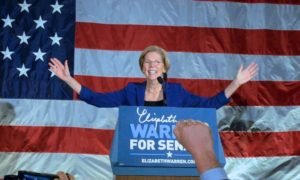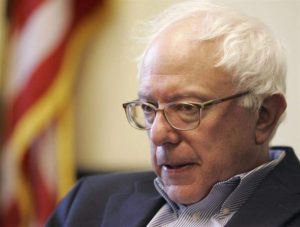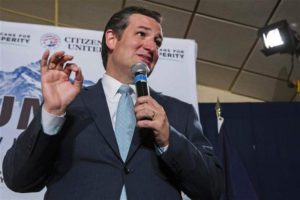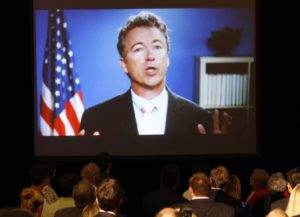If feedback on my “caucus countdown” column is any indication, there is a lot of interest not only for a wider field of potential 2016 presidential candidates, but for the nation to have a broad conversation regarding the future of money in politics, the overall economy and, specifically, the middle class. And, as is usually the case, there is significant disagreement on how such conversations can be generated and spread.

There is some thought a strong third party candidate on the left or right would be able to leverage the most influence; that those within either of the two large parties will be unable to rise above the star power of high-profile candidates. Some have pointed to a need for enhanced media coverage, while others believe the media is part of the problem. The “establishment,” by nearly all definitions, is considered too out-of-touch and/or bought off to invoke the passion required.
Speaking last weekend at a Clinton County Democrats event in Goose Lake, Sen. Bernie Sanders, a Vermont Independent, echoed many of the comments I received from readers across the Midwest.
“The American people, including millions who have given up on the process and no longer vote, must become engaged in fighting for the future of this country,” he said.
“We need a political revolution in which the government works for ordinary people rather than the wealthy and their corporate lobbyists. We need a serious discussion about serious issues. We need to know how we got to where we are today, and where we want to go in the future.”
Third Party Bids

For the most part, individuals on the left with concerns about the influx of money into politics and the decline of the middle class are looking to Sanders and Sen. Elizabeth Warren, a Massachusetts Democrat, as their torch bearers. Those on the right with the related concerns of inflated government and diminished personal rights lean toward Sen. Rand Paul, a Kentucky Republican, or Sen. Ted Cruz, a Texas Republican. Predictably, these same officials, known for their abilities to capture the national spotlight and rally people around a common cause, are the ones being mentioned and encouraged for third party presidential runs.
“Sanders will have little effect if he enters the Democratic primary,” writes Green Party member and North Carolina resident Michael Trudeau.
“Clearly, Sanders does not have the support he needs in the Democratic Party to win the primary. And the Democratic primary is not a democratic process — its elite superdelegates have disproportional voting rights. … And raising issues to Clinton in the primary will not change the direction of the Democratic Party, just as Dennis Kucinich did not change the direction of the Democratic Party.”
Trudeau suggests the only way an outsider candidate can make headway and steer the national conversation is during a general election (not during a primary), and that the Green Party, which was put a relatively unknown candidate on the ballot in 44 states during the 2012 elections, is the only place on the left with the infrastructure needed to support such a bid.
“You do not challenge the corporate duopoly by joining it,” he said.
Harnessing Iowa’s Power

While I can’t and won’t disparage Trudeau’s passion for his political affiliation and policy beliefs, I will fault him for not being an Iowan and understanding the power and influence garnered from the first-in-the-nation contest held here.
Anyone who has spent time in or around Iowa politics is familiar with the calendar wars. Each year the political parties set nomination calendars and, also each year, one or more states try to game the system led by Iowa and New Hampshire. While there are several reasons this happens, the situation can be boiled down to two things: power and influence. New Hampshire, as the first primary in the nation, and Iowa, as the first caucus in the nation, have them and the other states want them.
The truly sad part of the equation is that most Iowans have little understanding of their national standing. A select handful have been quoted as foolishly proclaiming the Hawkeye State should step aside. As small “D” democratic as such sentiment sounds, the truth is that Iowa and New Hampshire are the states best suited to reduce inflated primary fields.

Passing along the political baton to another state would result in reduced competition among candidates and less exposure for individuals and ideas outside of what the national media co-opts as mainstream. If proof is required, please compare the cost of a statewide media buy in Iowa to one in Florida or Arizona.
If Sanders or Rand or any number of candidates want to amplify their voices as part of the 2016 contests, they need to start talking in Iowa to Iowa residents and media outlets at all levels, and they need to do such talking as part of one of the two dominant political parties. While Greens and Libertarians are known to attend Democratic and Republican candidate meet-and-greets, the opposite does not hold true. Also, entering the contest as a candidate in one party does not require finishing the contest as part of that team.
If you want to own the stage, you’ve got to be willing to stand in the spotlight.
This column by Lynda Waddington originally published in The Gazette on May 25, 2014. Photo credit: Elizabeth Warren/Flickr, Lucas Jackson/Reuters, Brian Snyder/Reuters, John Sommers II/Reuters
